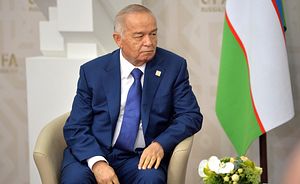Weekend reads (all about Uzbekistan):
The death of Uzbekistan’s long-time President Islam Karimov is something regional watchers have been anticipating for years without confidence about what would happen next. It seems, however, that everything is going mostly as planned.
None of the worst-case scenarios have played out; there’s been no succession war or overt power struggle. The chairman of the upper house of parliament, Nigmatilla Yuldoshev, who was constitutionally supposed to take the reigns of power in the interim deferred after a symbolic day to the prime minister. Now-acting President Shavkat Mirziyoyev–not surprising anyone–has just been nominated as a candidate for the December 4 elections.
This was predictable, Mathieu Boulegue argued over on Registan last week. Uzbekistan’s political nodes–the clans and powerful players in the security services–have been working “hand and hand at least since 2014 and decided on the transition long ago.” There was never going to be a succession war, Boulegue says. The powerful have an interest in perpetuating the system and there have been subtle changes over the last few years strengthening the prime minister and circling more power in the hands of the National Security Committee (SNB).
T. Kamilev (a pseudonym), in an interesting take for RFE/RL’s Qishloq Ovozi, focuses on what may lead to a change in the status quo, even in the absence of a grand power struggle. Political change in Tashkent doesn’t alter economic reality: two million Uzbeks work in Russia where remittances just aren’t worth what they used to be and environmental degradation is making Uzbekistan’s agricultural industry less and less efficient. On the back of this storm–comprised of economic, demographic, and environmental trends–Kamilev says, “Uzbekistan seems to be headed toward an upheaval.”
Mirziyoyev seems set to maintain Karimov’s policies, for now. Joshua Kucera, for EurasiaNet, outlined Mirziyoyev’s declared policies: “In the military/foreign policy section of the speech there were no surprises, and he explicitly confirmed that he intended to to pursue the isolationism that Karimov developed over the period of his rule.”
In the social arena nothing has changed either. Tashkent has apparently been pursuing rumormongers for spreading unofficial versions of when Karimov died. Karimov’s stroke on August 27, according to a Finnish neurosurgeon who was among the team treating him, essentially left the dictator brain dead. The state began preparing Samarkand for a funeral on September 1 but officially set his death date as September 2. Reportedly 12 people in Namangan were detained for discussing Karimov’s death ahead of the official announcement.
Listen: Make sure to take the time to listen to the RFE/RL podcast–with Muhammad Tahir, Sarah Kendzior, Steve Swerdlow, Alisher Sidik, and Bruce Pannier–discussing Uzbekistan without Karimov.
































